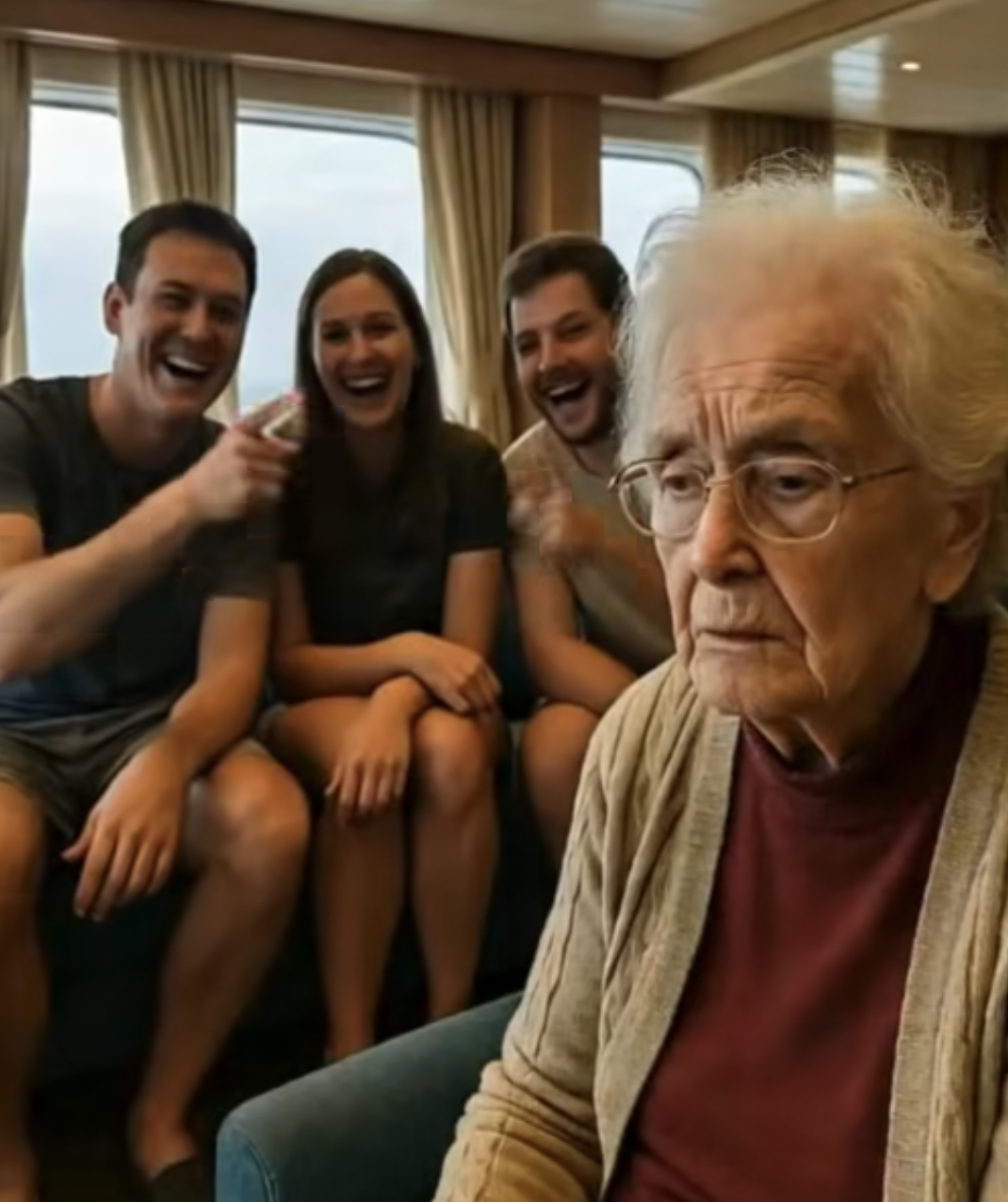“I’m sorry, but there’s no way she belongs here,” snapped the man in the linen blazer, motioning toward the older woman quietly sipping water by the window.
The server froze, glancing from the man to the woman. “Sir, she has access to the VIP lounge. Her wristband is valid.”
“It must be a mistake,” he huffed. “This is for gold-tier guests. That woman looks like she just wandered off the street.”
The woman, Esther, sat quietly in a well-worn cardigan and sandals. Her small suitcase rested beside her feet. She looked down at her tea as more guests began whispering.
“Maybe she won some contest.”
“Or got bumped up by accident.”
A couple nearby stood and asked the staff to move them elsewhere. A younger woman laughed and said, “She probably thinks this is the buffet.”
Esther turned to the server and whispered, “If it’s too much trouble… I can leave. I spent years saving for this cruise, but I understand. I don’t want to make anyone uncomfortable.”
The server opened her mouth to respond, but someone else spoke first. A deep voice, calm and firm, came from behind them.
“No, ma’am. You’re exactly where you’re meant to be.”
Everyone turned. The captain of the ship had entered the lounge.
He walked directly toward Esther, removed his cap, and smiled.
Then he looked around the room and said, “This woman isn’t just a guest. She’s the reason this ship was built in the first place…”
A thick silence fell over the room. The man in the linen blazer blinked. “What do you mean?”
The captain gently placed a hand on Esther’s shoulder. “Would you mind if I told them, ma’am?”
Esther looked up, her cheeks slightly pink. “If you think it’s worth telling.”
“I do,” he said softly. Then he turned back to the guests.
“Ladies and gentlemen, this is Esther Klein. Most of you don’t recognize the name, but many in the maritime industry do. She’s an engineer. Or rather, she was—now retired. Years ago, she helped design the stabilizing system used on this very ship.”
A few heads turned in surprise. The man who had complained narrowed his eyes. “She’s an engineer?”
“Not just any engineer,” the captain continued. “The kind who quietly broke rules and made lasting changes. Esther worked for Maritech Systems in the 1980s and ’90s—when women in her field rarely got credit, let alone recognition.”
Esther tried to wave him off, but he smiled.
“She proposed the dual-keel counterbalance system. It’s what allows this ship to remain steady during rough seas, without needing external stabilizers. Ever notice how smooth the ride is? That’s her legacy.”
The whispers shifted.
“She built the ship?” someone asked.
“No,” said the captain, “She gave it its legs. And she did it while being underpaid, overlooked, and—let’s be honest—underestimated. Just like now.”
The young woman who had joked earlier looked down.
Esther finally spoke. “I didn’t build the system myself. I was on a team. But yes, I helped design it.”
“You led that part,” the captain corrected. “Which is why, when I saw her name on the manifest, I ensured she had full VIP access. It’s the least the company could do. In fact…”
He reached into his pocket and pulled out a small velvet box.
Inside was a silver pin shaped like the ship’s hull, with a sapphire at the center.
“This is our Maritime Heritage pin. Awarded to those who’ve made a historic contribution to ocean travel. Esther, with your permission, I’d like to present it to you.”
The room remained silent as Esther accepted the pin, her hands trembling.
“Thank you,” she said, her voice cracking. “I never thought I’d actually sail on one of these. I always dreamed of it.”
“You deserve more than a dream,” the captain replied. “You deserve gratitude.”
The man in the blazer sat down quietly. He didn’t speak again.
Later that evening, Esther stood on the upper deck, watching the horizon as the sun dipped below the sea.
A woman approached—different from before—holding a young boy’s hand.
“Hi,” she said. “I wanted to apologize. I was one of the ones whispering. I shouldn’t have judged you.”
Esther smiled. “Thank you. That means a lot.”
“My husband works in aerospace,” the woman continued. “He always says how rare it is for women like you to get credit. I told my son about you. He’s six. Wants to be an inventor.”
Esther knelt to his level. “Be curious. Ask questions. Don’t let anyone tell you where you belong—not even grown-ups.”
The boy nodded, wide-eyed.
Esther chuckled and stood. She hadn’t been on a dock in years, let alone a ship.
Her late husband, George, had once dreamed of a cruise for their retirement.
But life had other plans.
He passed away before they could go. She buried herself in work.
Then one day, she found a letter tucked in a folder George had left.
It was titled “For Esther.”
Just three items:
* Ride the ship you helped build
* Dance on the top deck at sunset
* Tell someone your story
She had done the first. The second was beginning. The third… maybe that had started too.
The next night, during the captain’s dinner, Esther’s name was called again.
She paused, fork mid-air, as the spotlight found her.
The captain stood at the mic. “Esther, one more indulgence?”
She was brought to the stage. A small plaque awaited her:
“In Honor of Esther Klein – Quiet Mind, Steady Sea.”
A reading room aboard the ship would bear her name.
But then the true surprise came.
The captain smiled. “We also have a surprise guest—someone who’s wanted to meet Esther for a long time.”
From the side of the stage, a woman entered. Mid-forties. Short hair. Familiar features.
Esther’s breath caught. “Clara?”
The woman nodded, tears forming.
Clara had once been a young intern on Esther’s team in 1996. Full of ideas—until she suddenly vanished.
“I didn’t drop out,” Clara said into the mic. “I got pregnant. I didn’t think I could be a mom and an engineer. But Esther wrote to me. Encouraged me. I kept every letter.”
She held up a stack of yellowed envelopes.
“I got my degree. Spent 15 years in naval architecture. Now, I run a mentorship program for girls in STEM. Because of her.”
The audience rose in applause.
Esther’s hand covered her mouth, eyes glistening.
“You did the thing I only dreamed of,” she whispered.
“No,” Clara replied. “You gave me the dream.”
That night, under the stars, music played on the upper deck. The ship swayed gently—thanks in part to Esther’s design.
She stood at the railing. The captain appeared.
“George’s second wish, wasn’t it?” he asked.
Esther blinked. “What?”
He smiled. “Dance on the top deck at sunset?”
Her eyes widened. “How did you—?”
He shrugged. “Let’s just say a little bird left me a note. Your husband had friends. One of them’s on our board. He shared the list.”
Esther laughed, wiping a tear.
The captain offered his hand.
And so, she danced.
Slowly. Joyfully. With the wind in her hair and the hum of the sea surrounding her.
One couple joined. Then another. Soon, the whole top deck was alive.
For the first time in years, Esther didn’t feel invisible.
She felt seen.
She felt heard.
She felt home.
Sometimes, the world forgets to honor the quiet ones. The ones who build without applause. Who write equations while others hold the mic.
But sometimes, the tide remembers.
Esther boarded with a suitcase and silence.
She left with a legacy.
And a dance.
It’s easy to judge someone by their clothes or age.
Harder—but far more powerful—is to ask:
What’s their story?
And what could we discover if we simply took a moment to listen?




